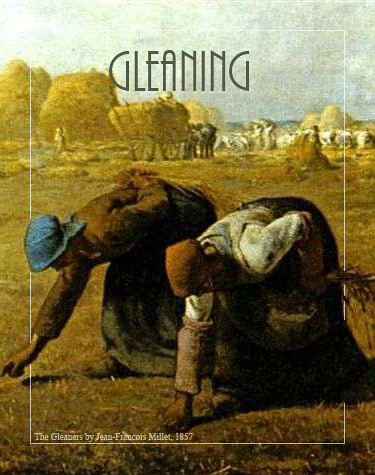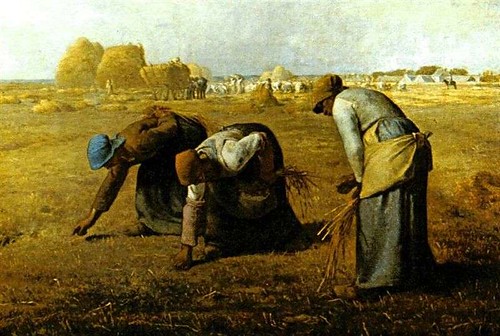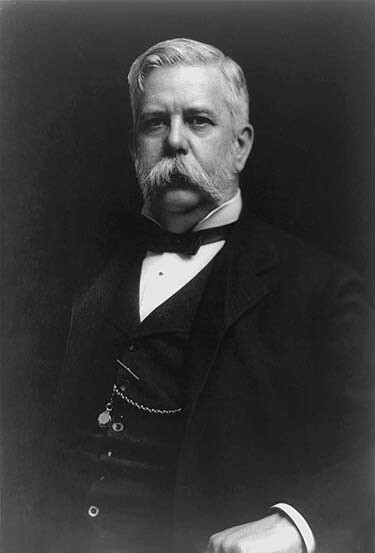
Volume XVIII, Issue VI: Gleaning in Our Modern World
Gleaning: Biblical Wisdom for Today
Now when you reap the harvest of your land, you shall not reap to the very corners of your field, nor shall you gather the gleanings of your harvest. 'Nor shall you glean your vineyard, nor shall you gather the fallen fruit of your vineyard; you shall leave them for the needy and for the stranger. I am the LORD your God.” – Leviticus 19:9-10
I love the Biblical account of Ruth and Boaz. If you are not familiar with it I urge you to read it. Many are touched by the love story therein but there is a deeper love story there that in a hasty reading we may indeed miss. Ruth is the daughter-in-law of Naomi, who though originally from Bethlehem, followed her husband and their two sons to Moab. The boys both married Moabite women. Naomi’s husband dies in Moab, as do both of her sons. She is left a widow and decides to return to her home country. She tells her two daughters-in-law to stay in Moab. It is at this point that Ruth makes an amazing declaration: “And Ruth said, Intreat me not to leave thee, or to return from following after thee: for whither thou goest, I will go; and where thou lodgest, I will lodge: thy people shall be my people, and thy God my God.” – Ruth 1:16
Upon returning home, Ruth goes out to glean in order to provide for herself and Naomi. In doing so she meets Boaz, the Kinsman-redeemer. This too is a Biblical concept, where no one was left behind because of a prescribed system of responsibility for family. Boaz owns the field where Ruth goes to glean. He arrives at the harvest site and greets his workers: “THE LORD BLESS YOU!” How many of you with employees would so greet YOUR workers? I daresay you might be sued for ‘Religious Harassment,’ but really, how many people would be blessed to know that sentiment from an employer? Really, I think we could stand a lot more of it. South Carolina Senator Tim Scott remembers his younger days, where his manager at Chick Fil A took him under his wing and helped him become confident through mentorship.
How many of you are investing in the lives of young people? We entrust the institution now with the job of preparing them for their futures, but now, with youths out of the institution, do you not see the great opportunity before us? Those of us with a heart for young people; Now is our time! I think of George Westinghouse, inventor of the railroad airbrake. Indeed we remember his contributions to transportation and electric power, but do we remember how the ‘Gentle Genius’ nurtured his colleagues? Westinghouse had been a foot soldier in the Civil War. He never forgot his simple roots and poured himself into the workers around him. The reason his inventiveness did not result in him having more patents than his rival Thomas Edison is simple. While Edison took all of his patents in his own name, Westinghouse was big on making sure his engineers were recognized by having their names on the things they created. Somehow that seems to me not all that different from leaving grain in the corners of your field.
And so we find Boaz leaving extra for Ruth to ‘find,’ even instructing his men to purposefully do so. Naomi notices this kindness. The story has a very happy and amazing ending as Ruth will become part of the family tree that will become the royal line of Israel!
The great stories are born in the worst times. Surely our day shall see such tales. We need to look beyond the present crisis to a time of promise fulfilled. Most importantly, stories like that of Ruth and Boaz give the God-fearer insight into the nature of the Divine. Truly He cares for His people. Let us extend that love to our fellows and see what He might do.

George Westinghouse
American Innovator

George Westinghouse, American Innovator.
The qualities of George Westinghouse which, it seems to me, gave him the supreme quality of genius, were the qualities of imagination, faith, and courage. We know many men of great mental vigor; we know many men of strong character. Those qualities are, of course, the background of any successful career, but I am sure none of us has ever known a man who combined the qualities of faith, imagination, and courage as they were combined in George Westinghouse.” – Paul D. Cravath
We need more heroes like George Westinghouse. In our day the development of great works and human decency are often (mistakenly) considered mutually exclusive. Westinghouse was a brilliant man, an innovator, and a captain of industry. He was worth millions of dollars but never forgot his humble beginnings. Westinghouse as a youth was one you would have not thought likely to succeed. School bored him and he preferred working in his father’s shops where he eventually found himself working at a very young age. Most of us remember that he invented air brakes for trains, but few remember that when he built his great air brake factory outside of Pittsburgh, he built beautiful houses for his workers and set up a monthly payment plan so that they could buy them. He even insured the houses so that if a family were to lose their breadwinner, they would not lose their home.
While other inventors like Thomas Edison accumulated many patents based on the work of their employees, Westinghouse assembled around him the best and brightest he could find and insisted that they receive attribution for their own patents. It is said that he would have well over a thousand patents had he registered them in his own name. His brilliant engineers were not all men either. Because of his generous attribution policy we know that he had in his employ one Bertha Lamme, Nineteenth Century electrical engineer.
Westinghouse went on to develop Alternating Current electrical generation capability, demonstrating it at the 1893 Chicago World’s Fair. He continued to pioneer improvements in railway equipment including electric locomotives and sophisticated block control systems which enhanced railroad safety greatly. He was inspired by Nikola Tesla, the Serbian-American inventor, electrical engineer, mechanical engineer, physicist, and futurist who is best known for his contributions to the design of the modern alternating current electricity supply system. He looked to Tesla’s work as he sought to make Alternating Current practical for powering industry. In his lifetime Westinghouse created over forty different companies and made possible many of the appliances we take for granted in our homes today.
Westinghouse practiced Christian principles in his management style though he firmly believed in the freedom of his workers. He chose to live his beliefs in example rather than by preaching. He was a modest and temperate man, always devoted to his wife Marguerite Erskine Westinghouse. This quote says volumes about the man: “If someday they say of me that in my work I have contributed something to the welfare and happiness of my fellow man, I shall be satisfied.”
If my people, which are called by my name, shall humble themselves, and pray, and seek my face, and turn from their wicked ways; then will I hear from heaven, and will forgive their sin, and will heal their land.” – 2 Chronicles 7:14
Today we join with many churches praying for an end to the Corona Virus. We pray for reconciliation and healing for our land.
